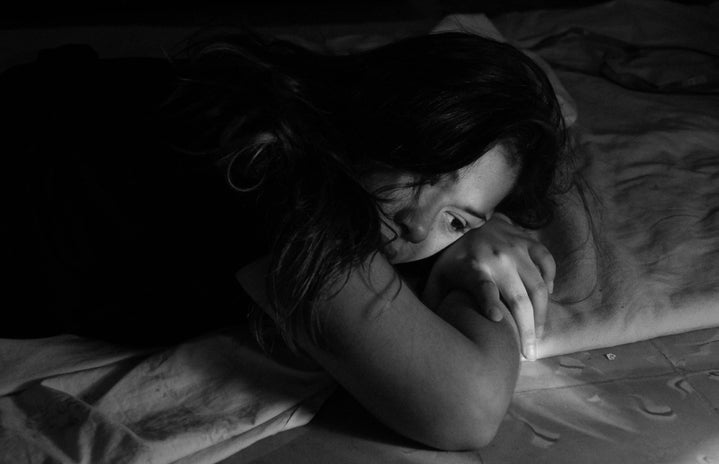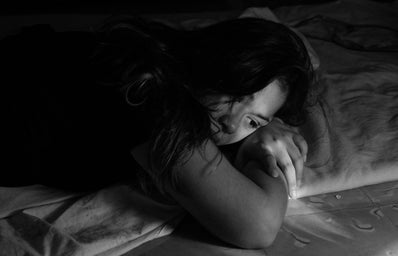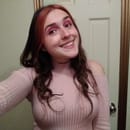I have always been an anxious person — in kindergarten, I had horrible separation anxiety and feared large crowds. As I went through elementary school, there were times when I felt unbearably anxious but I wrote it off as being shy and did my best to push through. By junior high, anxiety came in full force — being in crowded hallways made me feel like I couldn’t breathe, my mind was always racing, and I constantly worried that I would say the wrong thing so I had to plan out a simple sentence at the lunch table. Some days I’d cry before school because I knew how bad I’d feel if those pangs of anxiety hit and yet I never told anyone how I felt. I knew my family and friends had their own stresses and so I held everything inside. I didn’t realize that it was anxiety that made me feel that way, all I knew was that it wasn’t normal and I hated it. I wanted so desperately to be happy and carefree like my friends were and yet I couldn’t, so I took it as a personal failure. I felt like something was wrong with me.
In 9th grade, I transferred to a smaller charter school, which felt like a fresh start in many ways. My anxiety was more manageable, but there were still times when it would hit hard. By the time I entered college, I felt like I was in an okay place but I still noticed some things would trigger an anxiety attack, such as walking through a crowded hallway or club fair and suddenly it felt like I was in seventh grade again — my cheeks felt hot and I felt like everyone was staring at me, waiting for me to mess up. I avoided going to events or anything where there would be a large crowd of people if I had to go alone. Even if I had a friend with me, the second I was alone in a crowd my anxiety would rise. I hid my anxiety by staying so busy that my mind didn’t have time to think of anything else. If I wasn’t at work, I was at school, visiting my grandparents, out with friends, taking extra classes, etc.
In March 2020, the pandemic hit and suddenly all my classes were online and my job as a Pre-K teacher was gone as our center closed. As the months rolled on, my health anxiety grew stronger and I began to feel so isolated. By December 2020, I had lost a loved one to COVID-19 and had several other loved ones contract it and become very ill, one of which was my best friend who was perfectly healthy before she got it. I had the worst fear that I was going to lose her forever. She battled COVID for months, visiting countless specialists and a heart and lung failure clinic, going on medications, going to respiratory therapy, etc. The once active hiker, gymnast, paddle-boarding enthusiast could barely make it through Target and I was devastated for her. As I watched the world suffer it felt inescapable. In the past I could distract myself from my anxieties by delving into other things or focusing on helping those around me, but after the pandemic hit my whole world shifted, as it did for everyone. I felt so hopeless that I began to isolate away from my friends and my anxiety hit an all-time high. I had anxiety attacks and feared that things would never get better.
As time went on, I still had anxiety about the pandemic and about whether I would lose more loved ones to it. I did my best to persevere although it was not easy. I thought that 2021 would be a better year, but so many issues arose. My dog was attacked by another dog, my cat was diagnosed with CKD, my grandmother fell and broke her hip (thus having to be hospitalized during the height of the Delta surge), my mother had two surgeries on her arm and immense pain due to a botched surgery that was meant to help with her carpal tunnel, my sister had to have surgery, I went through a breakup, and my grandfather was hospitalized twice and was diagnosed with Congestive Heart Failure and Afib. I felt so helpless because there was nothing I could do. I tried to avoid those feelings and my friends, family, and coworkers all did their best to support me as each of these things happened but everything still felt so heavy.
By November 2022, my anxiety hit a new high. I just went through a breakup and my mind wouldn’t stop racing. Negative thoughts flooded my mind in the daytime making it hard to focus, my nausea became so bad I couldn’t eat, my health anxiety came roaring back, and I began waking up with pangs of anxiety in the middle of the night, unable to fall back asleep. My nervous system was so hyper-aroused that I was only able to get 2-4 hours of sleep before waking up with my heart pounding and mind racing. I couldn’t even sleep in my bed without panicking because I knew that impending sense of doom would hit so I began sleeping on my couch. This helped a little but I still was waking up exhausted yet adrenaline-filled from panic attacks. I was crying incessantly and knew I couldn’t go on like this. Every day was getting harder and harder, so I went to my primary care doctor and asked to try an anti-anxiety medication. He prescribed a low dose of sertraline (Zoloft).
In November I started taking sertraline. I didn’t know if it would help or not and part of me was still convinced that my experience wasn’t universal and that it was all in my head. I started taking my prescription and felt this ease; I don’t know how to describe it other than that of a warm blanket being placed on me. My nausea lessened and my appetite began to come back, my mind wasn’t constantly racing, and although I still woke up in the middle of the night, my heart and mind were able to slow down enough to fall back asleep. Suddenly my unbearable anxiety became bearable. While it didn’t completely go away, it was enough for me to be able to sleep and not feel like my heart was going to burst out of my chest at any given moment.
There were also symptoms of anxiety that I didn’t recognize until I started my medication, like running out of breath easily. I thought this was a reflection of my physical health, but once I started taking sertraline I was able to continue conversations without feeling like I was lacking air. I just feel a general sense of peace that I haven’t felt in a long time, if ever. There is such a stigma around mental illness and medication that I myself fell into even as a psychology major. I’ve always been one to advocate for individuals to get treatment and seek out support in whatever ways they need to but when it came to myself it felt like I had failed as a human, which is not how anyone should feel when suffering from a mental illness. While medication does not work for everyone, it has helped me immensely. I am currently planning on seeking out therapy as well as I know that a combination of the two is best for working through anxiety. Throughout this last month I’ve recognized that I have many unhealed pieces from my past that I need to heal.
I wish I would’ve sought out help earlier on because I feel like I missed out so much of my life because of my anxiety. My relationships suffered and I had so many days where I didn’t know what to do because I felt so awful but didn’t want to worry anyone. We shouldn’t have to hit our breaking point to seek help — for me it took hitting some of my lowest of lows to get help but anyone can seek out therapy to work through past traumas, daily stressors, relationships, and more. While for some therapy on its own can be beneficial, for others medication is necessary and neither should be seen as bad. We have to talk about mental illness if we want to address the stigma. Everyone deserves support and we can help support one another by showing that it is possible to get better. We owe it to ourselves to make our communities a space where those experiencing symptoms of mental illness feel safe enough to seek out help. If you’re going through a hard time, know that it can get better and the first step to improvement is getting support, whether it’s reaching out to a trusted loved one, your primary care doctor, or a therapist. Healing is always possible.



